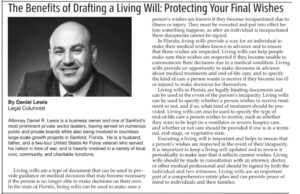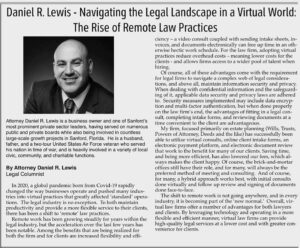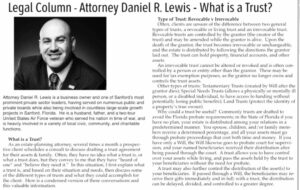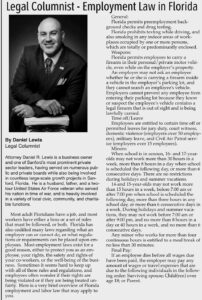Latest legal article in My Sanford Herald discusses Living Wills  – what are they & why do I need one?
– what are they & why do I need one?
#Sanford #Florida #law #Sanford #attorney #newspaper #probate #livingwill #sanfordattorney #legal #law #estateplanning


The latest legal article written by Attorney Lewis in the Sanford Herald discusses the rise and use of virtual law practice in the industry:

Odds are you have heard of a Trust Agreement, but what is a Trust? What types of trusts are there? My latest legal article in The Sanford Herald discusses this!

In his latest legal article in The Sanford Herald, Attorney Lewis covers some employment laws governing workers in the State of Florida.
———-
Employment Law in Florida
Most adult Floridians have a job, and most workers have either a boss or a set of rules that must be followed, or both. Florida has also codified many laws regarding what an employer can or cannot do, or what regulations or requirements can be placed upon employees. Most employment laws exist for a good reason, either to protect you as an employee, your rights, the safety and rights of your co-workers, or the well-being of the business. Sometimes it seems hard to keep up with all of these rules and regulations, and employees often wonder if their rights are being violated or if they are being treated unfairly. Here is a very brief overview of Florida employment and labor law that may apply to you.
General:
Florida permits preemployment background checks and drug testing.
Florida prohibits texting while driving, and also smoking in any indoor areas of workplaces occupied by one or more persons, which are totally or predominantly enclosed.
Weapons:
Florida permits employees to carry a firearm in their personal/private motor vehicle, even while on the employer’s property.
An employer may not ask an employee whether he or she is carrying a firearm inside a vehicle in the employer’s parking lot, and they cannot search an employee’s vehicle. Employers cannot prevent any employee from entering their parking lot because they know or suspect the employee’s vehicle contains a legal firearm that is out of sight and is being lawfully carried.
Time off/Leave
Employees are entitled to certain time off or permitted leaves for jury duty, court witness, domestic violence (employers over 50 employees), military leave, and Civil Air Patrol service (employers over 15 employees).
Minors:
When school is in session, 16- and 17-year-olds may not work more than 30 hours in a week, more than 8 hours in a day when school is scheduled the following day, or more than 6 consecutive days. There are no restrictions during holidays and summer vacations.
14-and 15-year-olds may not work more than 15 hours in a week, before 7:00 am or after 7:00 pm when school is scheduled the following day, more than three hours in any school day, or more than 6 consecutive days in a week. During holidays and summer vacations, they may not work before 7:00 am or after 9:00 pm, and no more than 8 hours in a day or 40 hours in a week, and no more than 6 consecutive days.
Any minor who works for more than four continuous hours is entitled to a meal break of no less than 30 minutes.
Final Pay:
If an employee dies before all wages due have been paid, the employer may pay any amount of wages or travel expenses that are due to the following individuals in the following order: Surviving spouse; Child(ren) over age 18; or Parent.
